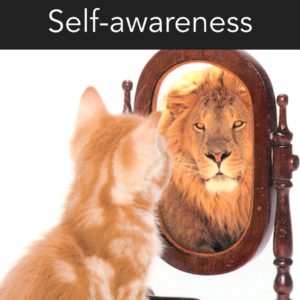By Rose O. Sherman, EdD, RN, FAAN
 A young leader recently sought coaching help because she was feeling very insecure in her new role and afraid of failure. I applauded her willingness to be self-reflective about her leadership and recognition of a need for help. She was exhibiting a high level of self-awareness. Self-awareness is one of the 5 key components of emotional intelligence. This means as a leader, you recognize your own emotions and how they affect your thoughts and behavior. You know your strengths and weaknesses, and have self-confidence.
A young leader recently sought coaching help because she was feeling very insecure in her new role and afraid of failure. I applauded her willingness to be self-reflective about her leadership and recognition of a need for help. She was exhibiting a high level of self-awareness. Self-awareness is one of the 5 key components of emotional intelligence. This means as a leader, you recognize your own emotions and how they affect your thoughts and behavior. You know your strengths and weaknesses, and have self-confidence.
In our highly culture,many of us operate on the belief that we must appear as though we know everything all the time or else people will question our abilities, diminishing our effectiveness as leaders. Self-awareness in leadership should be valued because there is acknowledgement that leadership is a journey and you have never quite arrived.
But for this leader, her self-awareness was just the first step. Acknowledging the need to become better at anything is only the beginning, and it’s often the most difficult step in the whole process. In many cases, individuals successfully come to the realization that something’s not working but have no clue how to change it into something that works. That was the situation with this young manager. She needed to seek feedback on whether the anxiety she was feeling was just a natural part of a new transition or was it impacting her ability to be an effective leader. During our conversation, we identified five individuals that she needed to seek feedback from including her director, two peers and two of her charge nurses. One of her concerns involved her visibility and whether she was approachable. Although she recognized a need to commit to leadership rounding, her anxiety sometimes led her to shut down and retreat to her office. She formulated a list of some very good questions and committed to listening to the responses without justifying or defending her actions.
In his Harvard Business Review Article, How Leaders Become Self-Aware, business expert recommends the following three actions that leaders can take:
- Test yourself. Instruments such as the Myers-Briggs, Strength-Finders and Disc can be helpful in facilitating self-reflection and gaining self-awareness. Understanding which core trait drives your decisions and your attitude is what is most important for increasing the probability for success.
- Watch yourself and learn. Tjan recommends leaders follow the steps taken by industry icons like Warren Buffet and write down the reasons behind your key decisions and then after implementation, reflect and assess the outcomes. Regular attention to this second step avoids the “backward rationalization” many fall prey to.
- Be aware of others. Observing other people’s strengths will serve to inform the self-aware leader about what they do well, and will help them appreciate and value the different approaches brought by others. Here, too, the insights from a quality behavioral assessment would provide a framework for observation and learning.
Tjan reminds us that self-reflection and its reward of self-awareness cannot be thought of as passive exercises, new era meditation, or soft science. They’re absolutely essential. There is a reason why in rehabilitation programs the starting point is being aware enough to admit you have a problem. So, too, is the case in business leadership and personal development.
© emergingrnleader.com 2018


 LinkedIn
LinkedIn Instagram
Instagram